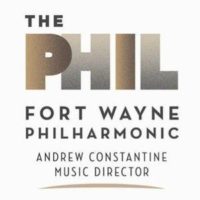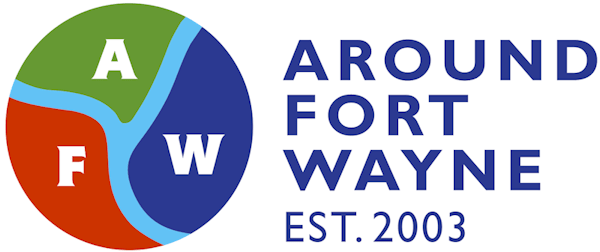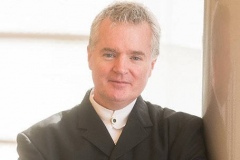
News release from the Fort Wayne Philharmonic:
The Phil Opens 2015/16 Season with Popular European Composers Rachmaninoff and Dvořák Featuring Cellist Johannes Moser
(September 8, 2015) — The Fort Wayne Philharmonic will embark on a journey of striking melodies, lush harmonies and the sumptuous beauty of Slavic classical music in the 2015/16 Masterworks Series opener, “Rachmaninoff and Dvořák,” Saturday, October 3, 7:30 p.m., at the Embassy Theatre.
Conducted by Artistic Director Andrew Constantine who is beginning his sixth season with The Phil, “Rachmaninoff and Dvořák” includes Smetana’s Overture to The Bartered Bride, Rachmaninoff’s Symphonic Dances and Dvořák’s Concerto for Cello and Orchestra, Op. 104, B minor featuring world-renowned cellist Johannes Moser.
“So much to look forward to in our new season at The Phil. Not only fabulous soloists, including the mind-blowing greatness of Johannes Moser on opening night, but also an enormous tapestry of wonderful music that will stir your emotions. Rachmaninoff, Tchaikovsky, Beethoven, Barber and so much more! Come and be with your friends and neighbors to share and enjoy the incomparable experience of hearing great music, live, with your very own Fort Wayne Philharmonic,” Constantine said.
Beginning the evening’s performance will be Smetana’s Overture to The Bartered Bride, a pleasant comic opera that firmly established Smetana as a Czech nationalist. This high-spirited overture is one of the most popular works in the orchestral repertory and it is filled with lively string passages and instilled with the distinct rhythms and inflections of the Czech language and folk dances. Interestingly enough, Dvořák, who would ultimately become the most famous Czech composer in the world, played viola in the orchestra that premiered The Bartered Bride in 1866.
Next on the program, German-Canadian cellist Johannes Moser will be featured on Antonin Dvořák’s Concerto for Cello and Orchestra, Op. 104, B minor. The New York Times noted of Moser that “…he brought the house down” during his Carnegie Hall debut, and has also been described by Gramophone Magazine as “one of the finest among the astonishing gallery of young virtuoso cellists.” Johannes Moser has performed with many world-class orchestras including the Los Angeles Philharmonic, Munich Philharmonic and Israel Philharmonic Orchestras as well as the Chicago Symphony, London Symphony, Royal Concertgebouw, Tokyo Symphony, Philadelphia and Cleveland Orchestras among many others. He first captured international attention at the 2002 Tchaikovsky Competition where he took both the top prize and was also awarded the Special Prize for his interpretation of the Rococo Variations. Moser very recently recorded Dvořák’s Cello Concerto for his recording debut with PENTATONE. In a review of Moser performing Dvořák’s cello concerto in March of 2015, journalist Kenneth Delong from the Calgary Herald said of his performance, “…the program opened with a splendid performance of Dvorak’s ever-popular Cello Concerto, one of his most appealing works. On hand to perform the solo part was German-Canadian cellist Johannes Moser, who was the star of the evening. Embracing the solo part in a big-boned fashion, Moser was dramatic and lyrical by turn, tossing off the virtuoso elements with freedom and drama, and always alive to the poetry of the concerto…and also brought the audience to its feet.”
Composed when Dvořák served as a director of the National Conservatory of Music in New York City, his Concerto for Cello and Orchestra has become one of the most beloved cello works in the repertory. Many regard the work as the pinnacle of the repertoire for cello and orchestra. In this monumental work, Dvořák explores the entire spectrum of human emotion, very much inspired by his own experiences, ranging from exhilarating bursts of life in New York City to the devastating tragedy of his unfulfilled love. Unlike his New World Symphony, no obvious American influences can be discerned within its melodies or harmonies. This distinguishing quality has been cited as an indication that the composer was longing to return to Bohemia.
Concluding the program is Rachmaninoff final composition, the Symphonic Dances. Throughout much of his career, Rachmaninoff enjoyed success in composing but he was known to the public as a great, if not the greatest, pianist of his time. After a tepid reception to his Third Symphony in 1936 he decided to halt his compositional endeavors. During the summer of 1940, the urge to compose proved strong enough to push Rachmaninoff back into creating his final masterpiece. This is the only piece the composer wrote in its entirety within the United States.
Musically Speaking, the pre-concert lecture series before every Masterworks performance, will begin at 6:30 p.m. Lectures are held in the Gallery of the Grand Wayne Center and free to all ticket holders.
Subscriptions are still available for purchase. Benefits include the ability to keep the same seats year after year, the best seats at the best prices, 10% savings on additional single ticket purchases, VIP access to special events, and the flexibility of free ticket exchanges.
Tickets for “Rachmaninoff and Dvořák” start at just $17 and are conveniently available for purchase online at fwphil.org. Purchases can also be made in person at The Phil Box Office located at 4901 Fuller Drive or over the phone by calling 260-481-0777. The Phil Box Office is open Monday through Thursday 9:00 a.m. to 6:00 p.m., Friday 9:00 a.m. to 5:00 p.m., or Saturday (Masterworks and Pops concert days only) from 12:00 noon to 4:00 p.m. Tickets may also be available for purchase at the Embassy Theatre during normal operating hours and two hours prior to each concert. Full program and series information is available at fwphil.org.
About the Fort Wayne Philharmonic
Now performing its 72nd season, The Fort Wayne Philharmonic’s mission is to inspire and foster a lifelong love of classical music through performance and education. The Phil is led by Music Director Andrew Constantine. The Phil is a member of the League of American Orchestras and a funded member of Arts United of Greater Fort Wayne, the Indiana Arts Commission and National Endowment for the Arts. For additional information visit fwphil.org.

